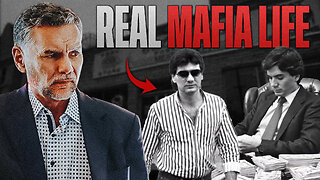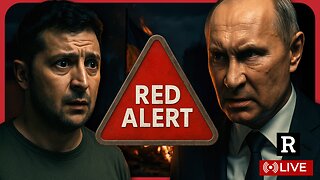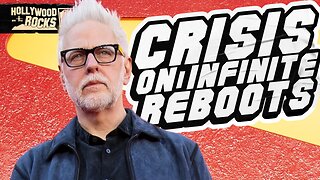Premium Only Content

Episode 3260: Science Without God: The Greatest Error of Modern Man
www.catholic-reboot.com
Nightly Zoom Coordinates for Rosary:
Meeting ID: 865 8978 0399
Passcode: Wjjv4960!
Speak Lord for your Servant is Listening
Book Recommendation of the Day
On the Uncertainty of Human Sciences (part of De Doctrina Christiana) by St. Augustine
• In this shorter treatise, Augustine explains how even the most brilliant human insights are fragile without the foundation of God’s wisdom.
• He contrasts eternal truth with the changing, limited scope of human science.
“Science Without God: The Greatest Error of Modern Man”
Opening & Greeting
Welcome to today’s episode. In the past two centuries, humanity has witnessed breathtaking advances. We’ve harnessed electricity, cured diseases, traversed the skies, and even walked on the moon. Yet, in the midst of this brilliance, something tragic occurred: man began to believe that God was no longer needed. Today we reflect on the true source of human achievement the Creator Himself and how forgetting Him has turned progress into peril.
Segment 1: The Triumphs of Human Ingenuity
Expansion:
• In 1800, daily life looked much like it had for centuries: agriculture by hand, travel by horse, limited medicine. By 2000, the world had cars, planes, antibiotics, computers, and global communication. This is nothing short of staggering.
• The Industrial Revolution (19th century) mechanized production. Factories, railroads, and electricity reshaped economies and societies.
• The Medical Revolution brought anesthesia, vaccines, and antibiotics. Diseases like smallpox and polio were eradicated or nearly so.
• The Scientific Revolution uncovered the invisible: atoms, microbes, DNA. These gave rise to modern chemistry and biology.
• The Technological Revolution of the 20th and 21st centuries gave man the power of flight, nuclear energy, computers, and space travel.
Catholic reflection: These achievements are undeniable testimonies to the extraordinary power of human intellect. But where did this intellect come from?
Scripture answers: “The spirit of man is the lamp of the Lord” (Proverbs 20:27).
St. Augustine reminds us: “Every good and perfect gift comes from above, from the Father of Lights.” Human progress is real but it is derivative, not autonomous.
Segment 2: The Great Error: Man Believes He Has Replaced God
Expansion:
• The Enlightenment in the 18th century seeded the idea that human reason alone was sufficient. Voltaire, Rousseau, and others dismissed divine revelation as unnecessary.
• The 19th century saw Darwin’s theories interpreted not just scientifically but philosophically: man was no longer God’s creation but a product of blind chance.
• By the 20th century, Nietzsche proclaimed “God is dead” a slogan that echoed across universities, governments, and even seminaries.
• Secular humanism began teaching that man’s genius could solve every problem without recourse to God.
This mindset seeps into everyday life: people still baptize children, but raise them without faith; they pray at funerals, but live as if heaven and hell don’t exist.
St. Paul saw this coming: “Professing themselves to be wise, they became fools.” (Romans 1:22).
Catholic reflection: The great error was not discovery, but pride the belief that man could be both source and standard of truth. Once God is pushed aside, man inevitably becomes his own idol.
Segment 3: The Consequences of Forgetting God
Expansion with historical case studies:
• Nuclear Science: The splitting of the atom brought nuclear power, but also Hiroshima and Nagasaki. Man learned how to release the energy of the stars — yet used it to annihilate cities.
• Medical Science: Advances in surgery and medicine saved countless lives. But the same tools led to legalized abortion, contraception, and euthanasia using medicine against life itself.
• Biology & Genetics: Discovering DNA revealed the blueprint of life. Yet instead of marveling at God’s design, some now claim to “recreate” life, pushing genetic engineering, cloning, and transgender ideology.
• Technology & Communication: The internet can connect the world, spread the Gospel, and educate. Yet it also fuels pornography, relativism, and mass manipulation.
Pope Pius XII warned: “Science is not an end in itself, but a means. Unless it has as its supreme guide the recognition of the law of God, it can destroy rather than build.”
Catholic reflection: Without God, science becomes a double-edged sword capable of saving life but equally capable of destroying it. Progress divorced from morality turns into regression.
Segment 4: The Correct Perspective: God as the Source of All Brilliance
Expansion:
• The Catholic worldview sees reason and faith as allies, not enemies.
• Science investigates the how of creation. Faith reveals the why.
• Every law of nature is not an argument against God, but a testimony to Him. Gravity, DNA, quantum mechanics all are ordered realities. Order presupposes an Orderer.
• The greatest Catholic scientists Gregor Mendel (genetics), Georges Lemaître (Big Bang theory), St. Albert the Great (natural sciences) never saw their work as contrary to God, but as worship through discovery.
St. Thomas Aquinas: “Reason in man is nothing else than the likeness of God, the Creator of all things.”
St. Albert the Great: “The aim of natural science is not simply to accept what others have said, but to investigate the causes at work in nature.”
Catholic reflection: When reason is guided by faith, man’s discoveries glorify God. But when reason cuts itself off from faith, it degenerates into arrogance and falsehood.
Segment 5: The Call to Humility and Gratitude
Expansion:
• Catholics today must reclaim the union of faith and reason.
• True progress is not measured by technological ability but by whether it serves human dignity and eternal salvation.
• We must ask: Do our discoveries bring us closer to God or drive us away?
• Modern Catholics should evangelize by reminding the world that every spark of human genius is a reflection of the divine intellect.
Pope John Paul II: “Faith and reason are like two wings on which the human spirit rises to the contemplation of truth.”
St. Augustine: “You have made us for Yourself, O Lord, and our hearts are restless until they rest in You.”
Catholic reflection: Humility is the antidote to pride. Gratitude is the cure for arrogance. To glorify God for every advance is not to diminish man, but to elevate him to his true dignity: a cooperator with the Creator.
Epistle – 2 Corinthians 8:16–24
"Thanks be to God, who hath given the same carefulness for you in the heart of Titus... Whether for Titus, my companion and fellow-laborer, or for our brethren, the apostles of the churches, the glory of Christ."
Reflection on the Epistle
St. Paul emphasizes here the collaboration of the early Church in spreading the Gospel. The work of evangelization is not done by one man alone, but through a communion of faithful disciples, each bringing his gifts to the mission of Christ. Titus and others are praised for their zeal, their integrity, and their willingness to labor for the glory of God.
St. Luke stands out among these collaborators. Though not one of the Twelve Apostles, his role was immense he preserved the words and deeds of Christ and the early Church in inspired Scripture. His Gospel reflects a physician’s compassion and a theologian’s clarity, highlighting Christ’s mercy, concern for the poor, and call to repentance.
For us, this Epistle teaches that we too share in this collaboration. Whether by preaching, teaching, giving alms, raising children in the faith, or simply offering our daily duties to God, we are called to be fellow laborers for the Gospel.
Gospel – Luke 10:1–9
"The harvest indeed is great, but the laborers are few. Pray ye therefore the Lord of the harvest, that he send forth laborers into his harvest. Go: Behold I send you as lambs among wolves... Heal the sick, and say to them: The kingdom of God is come nigh unto you."
Reflection on the Gospel
Christ’s instructions to the seventy-two disciples highlight several essential truths of mission:
1. The harvest is great: Souls are abundant and waiting, but laborers are few.
2. The mission is urgent: They are to travel lightly, relying on God’s providence, not worldly securities.
3. The message is simple but profound: “The kingdom of God is at hand.”
St. Luke preserved this Gospel teaching, but he also lived it. Tradition tells us he was not only a writer but also a missionary, traveling with Paul and later preaching the Gospel himself. He was a lamb among wolves, carrying no purse or staff but armed with the power of Christ’s message.
For us, this Gospel challenges us to discern how we are called to labor in the harvest. Are we willing to proclaim Christ in word and deed? Are we prepared to live with less attachment to worldly goods so that we can serve God more freely? The harvest is still great, and the laborers are still few.
Feast of St. Luke the Evangelist
St. Luke’s Gospel emphasizes Christ’s mercy, highlighting His love for sinners, the poor, and the marginalized. Luke also provides the most detailed account of Our Lady’s role in salvation history, preserving the words of the Magnificat and the story of the Annunciation.
As a physician, Luke combined a healer’s compassion with an evangelist’s zeal. As a historian of the early Church, he preserved the witness of the Apostles in Acts. His feast reminds us of the Church’s mission to proclaim the Gospel with fidelity, clarity, and charity.
Application for Today
• Be fellow laborers: Like Luke and Titus, offer your gifts for the mission of the Church.
• Live with missionary simplicity: Detach from worldly comforts so as to serve God more freely.
• Proclaim the Kingdom: Do not be silent share the faith at home, at work, and in society.
• Seek God’s mercy: As Luke shows, Christ’s mission is especially for the poor and the sinner.
Conclusionary Prayer
O God, who didst choose blessed Luke the Evangelist to reveal in his Gospel the meekness of Thy only-begotten Son, grant that we who have learned from him the ways of mercy may persevere in them until the end.
St. Luke the Evangelist, pray for us.
Sacred Heart of Jesus, have mercy on us.
Immaculate Heart of Mary, intercede for us.
-
 LIVE
LIVE
TheCrucible
57 minutes agoThe Extravaganza! EP: 58 with Guest Co-Host: Rob Noerr (10/22/25)
9,352 watching -
 LIVE
LIVE
Tundra Tactical
1 hour agoProfessional Gun Nerd Plays Battlefield 6
468 watching -
 LIVE
LIVE
Dad Saves America
5 hours agoWill China Overtake America? Balaji Srinivasan VS Steve Bannon on the Trade War
251 watching -
 LIVE
LIVE
Red Pill News
1 hour ago100’s of Billions In Gov Fraud Exposed on Red Pill News Live
3,139 watching -
 1:05:40
1:05:40
vivafrei
3 hours agoWicked Witches of the Psaki! The Party of Criminals and Liars! LIVE FROM SWITZERLAND!
76.8K37 -
 34:54
34:54
Michael Franzese
2 hours agoFormer Capo REVEALS: What My Life Was Really Like in the Mob
26.4K8 -
 LIVE
LIVE
LFA TV
19 hours agoLIVE & BREAKING NEWS! | WEDNESDAY 10/22/25
1,207 watching -
 LIVE
LIVE
freecastle
6 hours agoTAKE UP YOUR CROSS- Now may the Lord of peace himself give you peace AT ALL TIMES in every way!
126 watching -
 1:32:15
1:32:15
Redacted News
1 hour agoWW3 Alert! "No more talk!" Putin is ready to DESTROY what's left of Ukraine | Redacted News
90K78 -
 LIVE
LIVE
Film Threat
23 hours agoDC IS DOOMED! THE TOTAL COLLAPSE OF THE DCU | Hollywood on the Rocks
126 watching